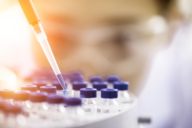
The Munich Metropolitan Region performs quite well in an intensified global competition: In 2016, approximately 190 biotechnology companies with 12,000 employees and approximately 35 pharmaceutical companies with 8,000 employees had their registered seat in the Munich region, indirectly securing jobs of approximately 4,000 employees working with 80 subcontractors and service providers.
“Life, the universe and everything” – opinions differ widely about the definition of the term life science. Life science is – after all – a highly dynamic and steadily developing field of research. From biotechnology, biochemistry and pharmacy, life sciences particularly includes the fields of science and engineering focussing on the functioning and structure of living organisms. Being one of Germany’s leading hubs for the biotechnology and pharmaceutical industry, Munich even has several life science competence clusters.
The Munich Metropolitan Region performs quite well in an intensified global competition: 15 percent of the German biotechnology companies are headquartered here, 30 percent of the national biotechnological drug development happens in the Munich area. In 2016, approximately 190 biotechnology companies with 12,000 employees and approximately 35 pharmaceutical companies with 8,000 employees had their registered seat in the Munich region, indirectly securing jobs of approximately 4,000 employees working with 80 subcontractors and service providers.
One of Munich’s key success factors is the excellent scientific environment being the home to the two universities of excellence, Ludwig Maximilians Universität (LMU) and the Technical University of Munich (TU), as well as to three renowned Max Planck Institutes and the Helmholtz Zentrum Munich, the German Research Centre for Environment Health. In 1973, the establishment of the Max Planck Institute for Biochemistry laid the foundation for the development of the biotechnology cluster in the Southwest of Munich and many more institutes and company foundations were to follow.
A further life science competence cluster is located in the Bavarian town Weihenstephan-Freising North of Munich, where the TUM School of Life Sciences Weihenstephan was founded in the year 2000 fwith a focus on researching genetic and biological components of foods and commodities as well as their production and processing, with an underlying aim of fostering the foundation of innovative companies. In 2015, the Munich School of BioEngineering (MSB) at the Technical University of Munich was established as integrative research centre located at the TU campus in Garching near Munich and the Rechts der Isar Hospital in Munich.
Munich as a research location further stands out in the field of life sciences by creatively connecting economy and science. Thus, the cluster organisation BioM supports synergies with the facilitation of events, speeches, panels and by acquiring funds. Two innovation and Start-Up Centres for Biotechnology (IZB) located in Planegg-Martinsried and Freising-Weihenstephan offer modern laboratory units and office spaces to young biotechnology companies next door to academic research.
This stimulating environment can also be host for events. Both Innovation and Start-Up Centres located in Martinsried and Weihenstephan boast impressive conference and meeting rooms and the Martinsried centre also offers accommodation with 42 modern rooms and suites at the IZB Residence CAMPUS AT HOME.
Since 1968, the global leading trade fair for laboratory technology, analysis and biotechnology, analytica, presents the world of laboratories. The leading global industry meeting point for experts from the fields of environmental, food and industry analytics, biochemistry, biotechnology, genetic engineering, molecular and cell biology, medical diagnostics and pharmacology takes place every two years in Munich; the 28th analytica will take place from 31st to 3rd April 2020 at the Messe München, the Munich Trade Fair Centre. The fair's program included the analytica conference as well as special events, forums, start-up events and a job centre.
Expopharm, one of the biggest pharmaceutical trade fair in Europe, is hosted once a year either in Dusseldorf or in Munich. In 2020 it takes place in Munich form 7th – 10th October.
The BioVaria is the meeting point for Europe’s top scientists and technology transfer organisations, investors and industry representatives for presenting promising life science projects and exploring possible partnerships. The top class conference takes place every year in the Sofitel hotel in the Munich city centre.
Analytica | Heilpraktiker Kongress des Südens | Expopharm | DAGA - Jahrestagung für Akustik | BioVaria